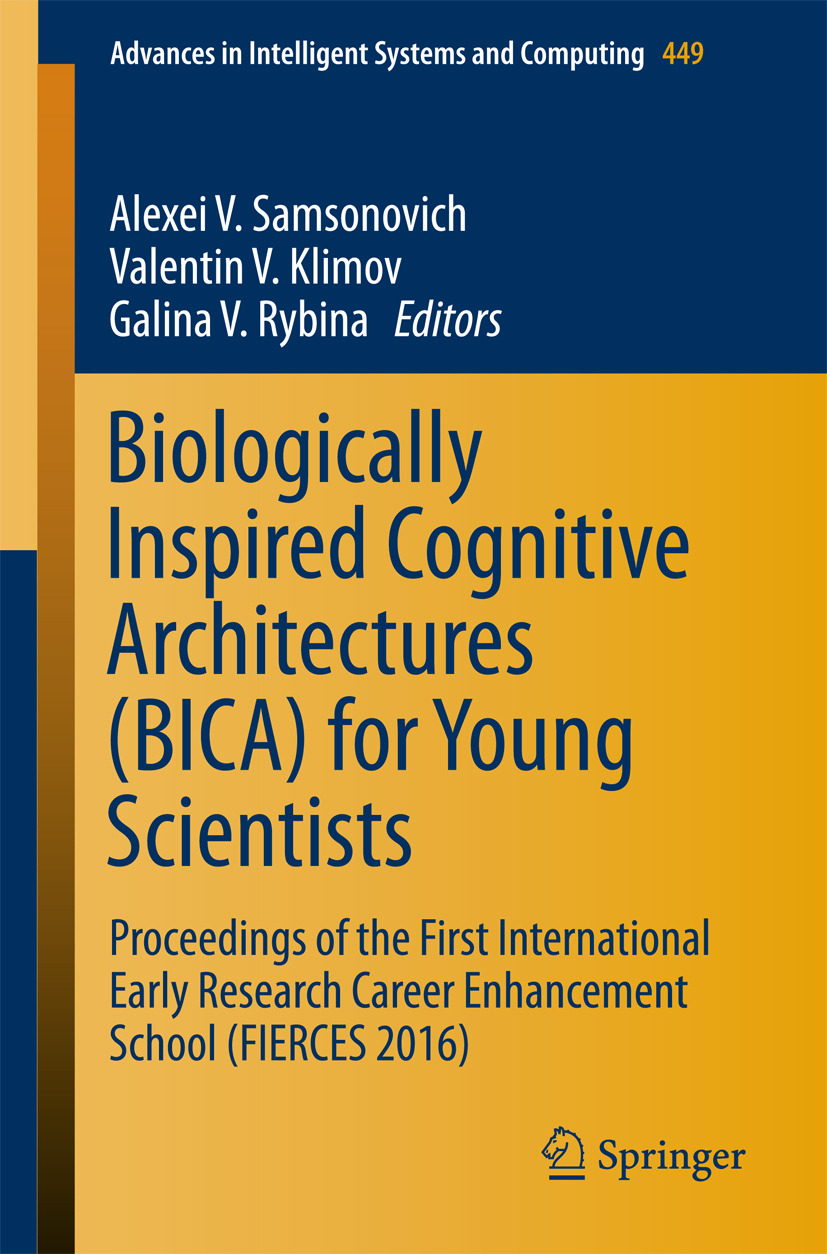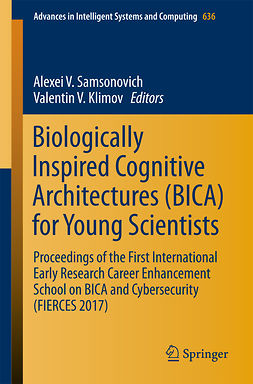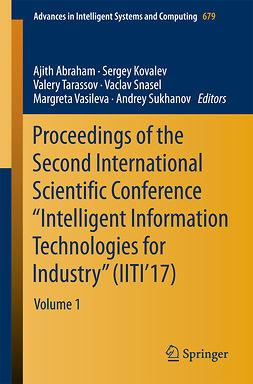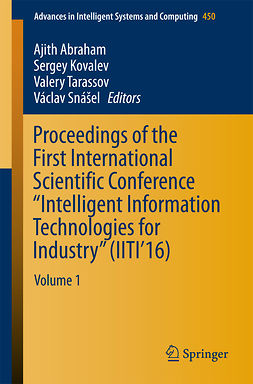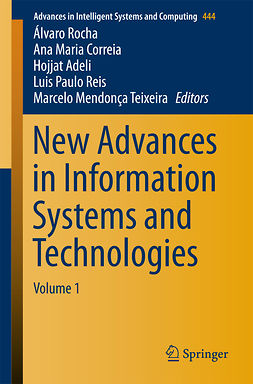Klimov, Valentin V.
Biologically Inspired Cognitive Architectures (BICA) for Young Scientists
1. The Cognitive Architecture Within the Natural-Constructive Approach
Olga Chernavskaya
2. Models of Autonomous Cognitive Agents
Vladimir G. Red’ko
3. Differentiation of Groundwater Tax Rates as an Element of Improving the Economic Mechanism in the State Groundwater Extraction Management
Ekaterina Golovina, Maksim Abramov, Artur Azarov
4. Users’ of Information Systems Protection Analysis from Malefactor’s Social Engineering Attacks Taking into Account Malefactor’s Competence Profile
Artur Azarov, Maksim Abramov, Tatiana Tulupyeva, Alexander Tulupyev
5. Character Reasoning of the Social Network Users on the Basis of the Content Contained on Their Personal Pages
Tatiana Tulupyeva, Alexander Tulupyev, Maksim Abramov, Artur Azarov, Nina Bordovskaya
6. Bayesian Optimization of Spiking Neural Network Parameters to Solving the Time Series Classification Task
Alexey Chernyshev
7. Simulation of Learning in Neuronal Culture
Alexey Degterev, Mikhail Burtsev
8. Biologically Plausible Saliency Detection Model
Natalia Efremova, Sergey Tarasenko
9. Active Adaptation of Expert-Based Suggestions in Ladieswear Recommender System LookBooksClub via Reinforcement Learning
Nikita Golubtsov, Daniel Galper, Andrey Filchenkov
10. Visual Analytics Support for Carbon Nanotube Design Automation
Vadim Kazakov, Vladimir Verstov, Lyudmila Zinchenko, Vladimir Makarchuk
11. A Model of Neurodynamics of Hippocampal Formation Neurons Performing Spatial Processing Based on Even Cyclic Inhibitory Networks
Zoia Kharybina
12. Feature Selection for Time-Series Prediction in Case of Undetermined Estimation
Khmilovyi Sergii, Skobtsov Yurii, Vasyaeva Tatyana, Andrievskaya Natalia
13. A New Approach for Semantic Cognitive Maps Creation and Evaluation Based on Affix Relations
Valentin Klimov, Artyom Chernyshov, Anita Balandina, Anastasiya Kostkina
14. On Alternative Instruments for the fMRI Data Analysis: General Linear Model Versus Algebraic Topology Approach
Irina Knyazeva, Vyacheslav Orlov, Vadim Ushakov, Nikolay Makarenko, Boris Velichkovsky
15. Application of Hopfield Neural Network to the N-Queens Problem
Andrei A. Lapushkin
16. Simulation of a Fear-like State on a Model of Dopamine System of Rat Brain
Alexey Leukhin, Max Talanov, Ilia Sozutov, Jordi Vallverdú, Alexander Toschev
17. Spatial and Temporal Parameters of Eye Movements During Viewing of Affective Images
Olga Lomakina, Lubov Podladchikova, Dmitry Shaposhnikov, Tatiana Koltunova
18. MEG Data Analysis Using the Empirical Mode Decomposition Method
Lyudmila Skiteva, Aleksandr Trofimov, Vadim Ushakov, Denis Malakhov, Boris M. Velichkovsky
19. Evolutional Approach to Image Processing on the Example of Microsections
Tatyana Martynenko, Maksim Privalov, Aleksandr Sekirin
20. “Cognovisor” for the Human Brain: Towards Mapping of Thought Processes by a Combination of fMRI and Eye-Tracking
Vyacheslav Orlov, Sergey Kartashov, Vadim Ushakov, Anastasiya Korosteleva, Anastasia Roik, Boris Velichkovsky, Georgy Ivanitsky
21. Dynamic Intelligent Systems Integration and Evolution of Intelligent Control Systems Architectures
Victor M. Rybin, Galina V. Rybina, Sergey S. Parondzhanov
22. Automated Planning: Usage for Integrated Expert Systems Construction
Galina V. Rybina, Yuri M. Blokhin
23. Features of Temporal Knowledge Acquisition and Representation in Dynamic Integrated Expert Systems
Galina V. Rybina, Ivan D. Danyakin
24. Collaboration of All-Purpose Static Solver, Temporal Reasoning and Simulation Modeling Tools in Dynamic Integrated Expert Systems
Galina Rybina, Dmitriy Demidov, Dmitriy Chekalin
25. Some Aspects of Intellectual Tutoring Based on the Integrated Tutoring Expert Systems Usage
Galina V. Rybina, Elena S. Sergienko, Iliya A. Sorokin
26. To the Question of Learnability of a Spiking Neuron with Spike-Timing-Dependent Plasticity in Case of Complex Input Signals
Alexander Sboev, Danila Vlasov, Alexey Serenko, Roman Rybka, Ivan Moloshnikov
27. Causal Interactions Within the Default Mode Network as Revealed by Low-Frequency Brain Fluctuations and Information Transfer Entropy
Maksim Sharaev, Vadim Ushakov, Boris Velichkovsky
28. Hierarchical Temporal Memory Implementation with Explicit States Extraction
Aleksey Skrynnik, Alexander Petrov, Aleksandr I. Panov
29. Swarm MeLiF: Feature Selection with Filter Combination Found via Swarm Intelligence
Ivan Smetannikov, Evgeniy Varlamov, Andrey Filchenkov
30. Agent-Based Model of Interactions in the Community of Investors and Producers
Zarema B. Sokhova, Vladimir G. Red’ko
31. Patterns of Spiking Activity of Neuronal Networks in Vitro as Memory Traces
Ilya Sokolov, Asya Azieva, Mikhail Burtsev
32. Ontology-Based Competency Management: Infrastructures for the Knowledge Intensive Learning Organization
Yury Telnov, Ivan Savichev
33. The Approach to Modeling of Synchronized Bursting in Neuronal Culture Using a Mathematical Model of a Neuron with Autoregulation Mechanism
Dmitry Volkov, Olga Mishulina
34. Dynamic Clustering of Connections Between fMRI Resting State Networks: A Comparison of Two Methods of Data Analysis
Victoria Zavyalova, Irina Knyazeva, Vadim Ushakov, Alexey Poyda, Nikolay Makarenko, Denis Malakhov, Boris Velichkovsky
35. Neural Network Solution of an Inverse Problem in Raman Spectroscopy of Multi-component Solutions of Inorganic Salts
Alexander Efitorov, Tatiana Dolenko, Sergey Burikov, Kirill Laptinskiy, Sergey Dolenko
36. Prediction of Relativistic Electrons Flux in the Outer Radiation Belt of the Earth Using Adaptive Methods
Alexander Efitorov, Irina Myagkova, Natalia Sentemova, Vladimir Shiroky, Sergey Dolenko
37. Comparative Analysis of Residual Minimization and Artificial Neural Networks as Methods of Solving Inverse Problems: Test on Model Data
Igor Isaev, Sergey Dolenko
38. A Biologically Inspired Architecture for Visual Self-location
Helio Perroni Filho, Akihisa Ohya
Nyckelord: Engineering, Computational Intelligence, Artificial Intelligence (incl. Robotics), Neurosciences, Cognitive Psychology, Biomedical Engineering
- Utgivare
- Klimov, Valentin V.
- Rybina, Galina V.
- Samsonovich, Alexei V.
- Utgivare
- Springer
- Utgivningsår
- 2016
- Språk
- en
- Utgåva
- 1
- Serie
- Advances in Intelligent Systems and Computing
- Sidantal
- 10 sidor
- Kategori
- Teknologi, energi, trafik
- Format
- E-bok
- eISBN (PDF)
- 9783319325545
- Tryckt ISBN
- 978-3-319-32553-8

